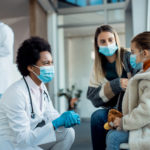Remember these seven things before bringing your newborn home from the hospital

Congratulations, you just had a baby! Now what?
Whether it’s your first, second, or eighth child, the initial weeks of life with a newborn can be a sleep-deprived blur. Hopefully, your first few days postpartum come with the support of knowledgeable, compassionate nurses and hospital staff. So before being discharged home with your bundle of joy, the experts at Boston Children’s Primary Care Alliance advise taking advantage of hospital resources while you can.
Here are a few suggestions:
Have your car seat inspected or installed
Many states have laws requiring newborns to have a properly fitted car seat, including a five-point-harness seat for infants and a specially fitted seat for babies under 5 pounds.
Ask your care team about a car seat check before leaving the hospital. Many facilities have certified child-safety professionals who help install or inspect your car seat to ensure a proper fit. If that’s not available where you deliver, many police and fire stations also offer this service.
Learn the swaddle (and other baby-care tips)
Swaddling your baby when they sleep can prevent flailing arms and legs, which triggers the startle reflex and wakes them. And no one knows how to swaddle a baby better than a labor and delivery nurse, so ask yours to teach you the best swaddle technique. While you’re at it, don’t hesitate to ask for other tips and tricks on newborn care, including bathing your baby, cutting their nails, and caring for the umbilical cord.
If you breastfeed, meet with a lactation consultant
Even if you’ve breastfed before or it’s going well in the hospital, it’s a good idea to meet with a lactation consultant (known as an IBCLC) before you are discharged. They can ensure your baby is latching correctly, set you up with a breast pump (many are covered by insurance), and answer any questions. It’s also helpful to ask about the best way to get assistance once you’re home. Some lactation consultants do in-home visits.
Stock up on the freebies
The hospital will most likely provide samples of items such as baby formula, diapers, lanolin cream, as well as a bulb nose syringe, peri bottle, pads, and mesh underwear. Don’t be shy about asking for a few extra. You’ll find these items to be invaluable once you’re home.
Call your insurance company
Avoid surprise charges by contacting your insurance company as soon as you can to add your newest family member to your plan. If you don’t have medical insurance, speak with your hospital’s social worker about your options.
Ask for help and boundaries
Whether it’s scheduling meal deliveries, cleaning services, or visits from friends and family, it’s a great idea to have support ready to help. When you’re ready for it.
Your pediatrician is there to help if you’re feeling overwhelmed or challenged in establishing boundaries for your new family. Dr. Michelle Lock of Commonwealth Pediatrics encourages new parents to discuss these issues during their first visits to the office.
Speak with your pediatrician
Infants can see their pediatrician multiple times within their first few months for weight checks and other vitals. If you’re able to schedule a few of these appointments before leaving the hospital, it’s one less thing to do once your home. If you haven’t found a pediatrician, the Boston Children’s Primary Care Alliance is a great place to start.
“Everyone loves to help with new babies, but it may take time to figure out what’s actually most helpful for you,” says Dr. Lock. “Some new parents want visitors to help rock and diaper the baby, while others prefer their friends and family drop off a meal or a load of clean laundry and save a visit for later.”
Learn more about Boston Children’s Primary Care Alliance.
Related Posts :
-

Ten questions to ask when choosing a pediatrician for your family
Selecting a pediatrician is an important decision and one that parents shouldn’t take lightly. Pediatricians specialize in caring for ...
-

Behavioral health: What parents should know
Even before a worldwide pandemic uprooted life as we knew it, our children have been grappling with an unprecedented health ...
-

HPV vaccine: What families should know
Nearly 42 million Americans are currently infected with human papillomavirus (HPV), and most adults will be infected at least ...
-

Choosing fetoscopic spina bifida care for Hadley
When Katie and Derek learned in 2024 that their daughter Hadley would be born with spina bifida, they quickly set out ...





